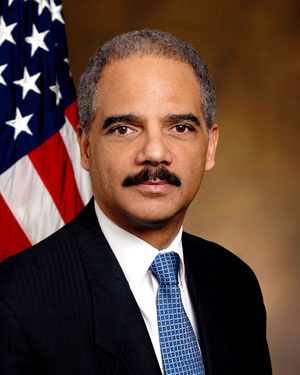Defending DOMA, Fighting Back
In a case in California, DOJ and DHS are fighting it out with House Republican leaders over immigration law regarding same-sex bi-national couples
Hamdi Lui and Michael Ernest Roberts, a same-sex couple married in Massachusetts but living in California, brought a case aimed at keeping Lui – a citizen of Indonesia – in the country and keeping the couple together.
Their lead attorney, the Center for Human Rights & Constitutional Law general counsel Carlos Holguin, just took over as the lead counsel on Aug. 30 and talked with Metro Weekly today about the original path taken by the case, saying, ”It had started out as kind of, what they considered to be a long shot but what they considered to be a good-faith effort to try and get Mr. Lui status.”

Eric Holder
Lui and Roberts have, though, found themselves in the middle of several complex legal and political questions being addressed by the Obama administration – from the constitutionality of the Defense of Marriage Act to immigration reform – and in the middle of a dispute that, as Holguin says, ”blew up into major, major litigation” involving all three branches of the federal government.
The couple has a lawsuit pending in the U.S. District Court for the Central District of California in which Roberts is arguing that his I-130 petition seeking to sponsor Lui as his spouse for immigration purposes was unconstitutionally denied by U.S. Citizenship and Immigration Services (USCIS) because the government has determined that DOMA prevents granting such petitions.
On Friday, Sept. 2, the Department of Justice – on behalf of Attorney General Eric Holder, Department of Homeland Security Secretary Janet Napolitano, USCIS Director Alejandro Mayorkas and the Los Angeles district director of USCIS – filed a brief in Lui and Roberts’s case in federal court arguing that DOMA should be found unconstitutional, which would then allow USCIS to consider granting Roberts’s I-130 petition.
Specifically, DOJ and DHS were responding to a motion made in the case earlier this year by the Bipartisan Legal Advisory Group (BLAG) – a five-person panel controlled by the House Republican leadership – seeking to have Roberts and Lui’s challenge to DOMA dismissed. The fact that BLAG intervened and filed a motion to dismiss the DOMA claim has not previously been reported, likely because filings in many immigration cases, including this one, are not available publicly.
Metro Weekly obtained a copy of the DOJ brief, which presents some of the facts of the case, notes BLAG’s June 17 filing and lays out the federal government’s case against DOMA – a case that Holguin says that the administration makes ”quite forcefully.”
In some ways, the filing is very similar to the July 1 DOJ brief filed in a lawsuit brought by Karen Golinski, in which the federal court employee is seeking the same health insurance coverage for her wife that a male employee could get for his wife, and the Aug. 19 filing in Edith Windsor’s case, in which she is challenging the more than $350,000 estate tax that she was forced to pay because the federal government refused to recognize her marriage to Thea Spyer.
Under the Equal Protection Clause of the 14th Amendment – applied to the federal government through the Fifth Amendment – all laws that classify people into groups receive a level of scrutiny: rational basis, which is the lowest form of scrutiny; intermediate scrutiny; or strict scrutiny. In all three briefs, DOJ lawyers argue that heightened scrutiny – though it doesn’t specify which level – should be applied to cases challenging classifications based on sexual orientation and that, under that standard, DOMA should be found unconstitutional.
But, with the Sept. 2 filing, the administration broke significant new ground, telling the court that DOJ and DHS believe that longstanding judicial deference given to immigration decisions made by Congress and the executive branch should not apply to DOMA-related immigration challenges like this one.
This, the lawyers argue, is because DOMA is an independent statute whose purpose is unrelated to immigration regulation. If it were related to immigration regulation, then the ”plenary power doctrine” – a legal doctrine that describes areas or governmental decisions that are controlled exclusively by one or two branches – would apply to the statute. The doctrine leads courts to apply rational basis to challenges to immigration decisions, which means they generally are upheld as constitutional and, thus, valid.
But, here, the administration argues, ”neither DOMA nor its legislative history suggests that DOMA was enacted as an exercise of Congress’s plenary power to regulate immigration and naturalization.” Because the administration argues that the ”plenary power doctrine” does not apply to Lui and Roberts’s challenge, the brief asserts that the heightened scrutiny that the administration has argued applies to DOMA in other contexts should apply here – regardless of the fact that this case is taking place in the immigration setting.
In other words, the Obama administration has taken a position in favor of the rights of bi-national same-sex couples by sidestepping the potential pitfall of the ”plenary power doctrine,” a move that increases the likelihood that DOMA – and its ban on allowing immigration law to recognize same-sex couples – would be found unconstitutional.
Additionally, the administration faults BLAG for relying ”[t]hroughout their brief” on a 1982 case decided by the U.S. Court of Appeals for the Ninth Circuit, Adams v. Howerton. The court held in the case that ”Congress has determined that preferential status is not warranted for the spouses of homosexual marriages.”
The DOJ lawyers argue, however, that ”[t]he reasons the Ninth Circuit Court of Appeals affirmed the denial of immigration benefits in Adams are no longer valid today,” citing changed laws – at the time of the opinion there was a statutory exclusion in the Immigration and Nationality Act for ”homosexual aliens” – as well as ”intervening events and changing legal and social understandings.”
Although BLAG will have a chance to reply to the arguments in the coming weeks, a hearing on the motion to dismiss already has been set for 1:30 p.m. Sept. 26 before U.S. District Court Judge Stephen V. Wilson, a Reagan appointee to the court.
At the same time, a related case – in which Lui is challenging the denial by the Board of Immigration Appeals (BIA) of his motion to reopen his immigration case – is pending in the Ninth Circuit. The case was one of the DOMA-related challenges listed on a Feb. 25 letter sent from the Department of Justice to House Speaker John Boehner (R-Ohio).
On June 8, Lui filed a motion to remand the case from the Ninth Circuit back to the BIA, which is an entity organized under DOJ to consider immigration claims, and the appellate court has scheduled a ”further assessment conference” in the case for Sept. 8. On June 28, after Holder – the named defendant – had responded to the motion, BLAG filed what is noted on the case docket as ”a notice of non-interest and intent not to intervene.” That notice from BLAG was filed after it already had moved on June 2 to intervene in the related trial court case brought by Lui and Roberts, a motion granted on July 13.
The specifics of BLAG’s decision to intervene in the case at the U.S. District Court and not in the case before the Ninth Circuit are not immediately clear from the limited information publicly available. Holguin called the lack of information available ”ridiculous,” noting that the distinction in the availability of the documents is based on the initial cover sheet filed by the attorneys in the case and a presumption by the courts that any case marked as an immigration matter ”is protected by the Privacy Act and everything is shut off from public view.”
From the docket information available and the procedural posture of the cases, however, immigration attorney Lavi Soloway says that BLAG could have concluded that no direct challenge to DOMA is at issue in the Ninth Circuit case because questions about the standard for reopening an immigration case could be the central legal arguments in that case. Holguin acknowledged that such considerations could have influenced BLAG’s decision. Judging from the DOJ brief in the U.S. District Court case, on the other hand, Soloway – who litigates in this area – says that DOMA’s constitutionality is squarely being challenged in that case.
After reviewing the brief, Soloway told Metro Weekly, ”The arguments in the DOJ brief in this case for the first time put the full force of the Attorney General’s office behind binational couples who have filed I-130 marriage-based petitions and, perhaps most importantly, behind those who have appealed denials of I-130 marriage-based petitions to the Board of Immigration Appeals.”
All of these legal developments, moreover, were happening in the midst of the Aug. 18 decision by Napolitano to announce in a letter to Senate Majority Leader Harry Reid (D-Nev.) that DHS and DOJ were acting to implement a June memorandum from John Morton, the head of the U.S. Immigrations and Customs Enforcement – the immigration enforcement arm within DHS – that stated that ICE would be exercising its ”prosecutorial discretion” to focus on the highest-priority cases.
Napolitano’s decision announced a broader DOJ-DHS partnership to review all pending cases of individuals in removal proceedings ”to ensure that they constitute our highest priorities” and to establish a similar process for determining which new cases would be placed in removal proceedings. Further, a senior administration official confirmed that same-sex couples would be included in the ”family relationships” that could lead to an individual, given other factors were met, being found to be a lower priority case.
Both the memorandum and letter dealt with removal proceedings; neither addressed what might happen with individuals not in removal proceedings and if or how they would be impacted by these changes. Although the decision by Napolitano and USCIS Director Mayorkas to oppose BLAG in this case doesn’t detail any policy change, it is a sign that – at least regarding cases involving same-sex bi-national couples – DHS and USCIS are on board with the administration’s actions to fight DOMA in court, even in the immigration setting where exceptional deference has been given to executive and legislative decisions.
That said, Holguin said that his concern is about the lack of clarity or certainty for couples like Lui and Roberts because of the ”fine line that the administration is walking between contending on the one hand that DOMA is unconstitutional and, on the other hand, that they’re going to continue to enforce the law until some court says it’s unconstitutional.”
Support Metro Weekly’s Journalism
These are challenging times for news organizations. And yet it’s crucial we stay active and provide vital resources and information to both our local readers and the world. So won’t you please take a moment and consider supporting Metro Weekly with a membership? For as little as $5 a month, you can help ensure Metro Weekly magazine and MetroWeekly.com remain free, viable resources as we provide the best, most diverse, culturally-resonant LGBTQ coverage in both the D.C. region and around the world. Memberships come with exclusive perks and discounts, your own personal digital delivery of each week’s magazine (and an archive), access to our Member's Lounge when it launches this fall, and exclusive members-only items like Metro Weekly Membership Mugs and Tote Bags! Check out all our membership levels here and please join us today!
























